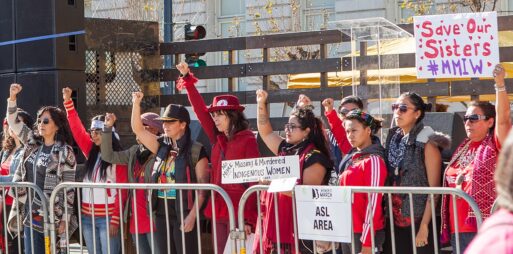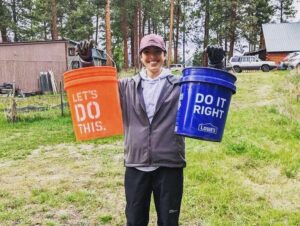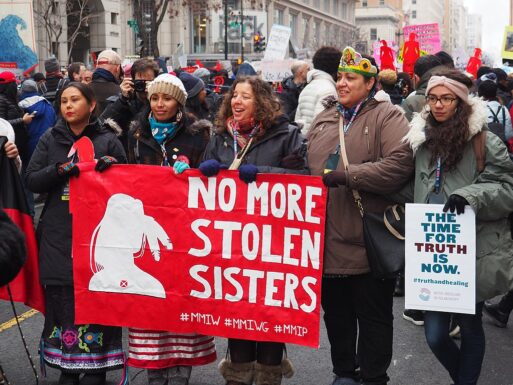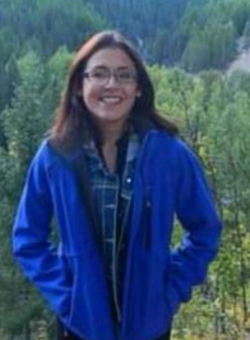
A 2018 women’s march in San Francisco to support missing and murdered indigenous women
Credit: Wikimedia Commons
The U.S. Bureau of Indian Affairs statistics show approximately 1,500 American Indian and Alaska Native missing persons have been entered into the National Crime Information Center throughout the country.
Approximately 2,700 cases of Murder and Nonnegligent Homicide Offenses have been reported to the Federal Government’s Uniform Crime Reporting Program. In total, BIA estimates approximately 4,200 missing and murdered cases have gone unsolved, according to the website.
“These investigations remain unsolved often due to a lack of investigative resources available to identify new information from witness testimony, re-examine new or retained material evidence, as well as reviewing fresh activities of suspects,” the website reads.
In addition, a 2016 study by the National Institute of Justice found that more than four in five American Indian and Alaska Native women, or 84.3%, have experienced violence in their lifetime, including 56.1% who have experienced sexual violence.
Ohkomi Forensics in Montana
Montana is among the top five states for Missing and Murdered Indigenous Women, according to a 2020 report from the Montana Department of Justice.
In September, Haley Omeasoo opened Ohkomi Forensics, a company that is dedicated to advocating for Missing and Murdered Indigenous People through community outreach and collaboration with tribal authorities, the website reads. She is a member of the Hopi Tribe and a Blackfeet descendant earning a Ph.D. in forensic and molecular anthropology at the University of Montana in Missoula.
Omeasoo is from Browning, Montana, where her relative and high school classmate Ashley Heavyrunner Loring also grew up. Loring has been missing for more than six years.

Ashley Heavyrunner Loring (center) is pictured with friends during her senior year in Browning High School, including Haley Omeasoo, second from left.
Submitted photo
Loring is a 27-year-old Native American who was last seen the week of June 13, 2017, in Browning on the Blackfeet Indian Reservation. She is 5 feet 2 inches tall and weighed 90 pounds at the time. She has a checkmark-shaped scar on the top of one of her hands.
Around the time Loring went missing, Omeasoo started her undergraduate work in forensics.

Haley Omeasoo out in the field
Submitted photo
“I watched her case fall through the cracks of the justice system and wanted to learn how to use some of these forensic techniques,” she said on a phone call.
Some include the correct way to handle evidence, identifying and examining burial sites, and crime scene analysis.
She hadn’t planned on opening her company right away, but everything fell into place, and it is really needed for the tribes there, she said.
“Right now we are trying to secure our funding and want to get a lab open on the reservation in a couple years,” she said. “When I graduate from here I will put my full time and energy into that.”
Melanie James went Missing in 2014
Another story about missing and murdered indigenous women was told in The New Yorker dated Feb. 1, 2024. One of the cases shared is Melanie James of Farmington, New Mexico, who disappeared in the spring of 2014 when she was 21 years old.
It describes the family’s journey, among other families, in trying to discover what happened to James from the time her mother reported her missing to the police. It also points out how they continue to search for clues, use social media, participate in marches, and meet with their attorney Darlene Gomez.

2019 Women’s March on Washington, D.C.
Credit: Wikimedia Commons
“New Mexico has the highest number of M.M.I.W. cases in the nation; in recent years, Gomez has served as the pro-bono family advocate for 20 such cases, helping families negotiate court proceedings and communicate with law enforcement,” the story reads.
Gomez said she uses some of her connections with the police, the court systems, and other agencies and resources to help the families.
National Inquiry in Canada
A Canadian public inquiry took place from 2016 to 2019 to study the Missing and Murdered Indigenous Women crisis. A final report was sent out as a news release from Gatineau, Quebec, on June 3, 2019.
“The National Inquiry’s Final Report reveals that persistent and deliberate human and Indigenous rights violations and abuses are the root cause behind Canada’s staggering rates of violence against Indigenous women, girls and 2SLGBTQQIA [two-spirit, lesbian, gay, bisexual, transgender, queer, questioning, intersex, asexual, and all other sexual orientations and genders] people. The two-volume report calls for transformative legal and social changes to resolve the crisis that has devastated Indigenous communities across the country,” the website reads.
The report delivered 231 individual Calls for Justice aimed at institutions, governments, industries, social service providers, and all Canadians. On June 5, 2023, CBC sent out a report card on the MMIWG inquiry’s calls for justice. To date, only two of the 231 calls have been completed, according to the CBC analysis.
Searching for Human Remains
Meanwhile, Omeasoo continues her search for Loring.
“It’s not really search and rescue now, it’s search and recovery, which is what me and my team specialize in — looking for human remains,” Omeasoo said.

In addition to scientific methods, she and her staff rely on and trust tribal knowledge and oral tradition, where the information can only be passed down by the tribal elders and within the community and not shared online.
“Ohkomi Forensics strives to be a voice that gives back identity to the missing and murdered Indigenous people whose cases remain unsolved,” her vision statement reads. “By providing expertise and hope, the end goal is justice and healing for families grieving a loved one.”
What Does that Feel Like?

Loring has been missing for more than six years.
Credit: FBI.gov
Omeasoo said it has been really painful watching Loring’s family go through this experience.
“It’s been over 6 years now and she is still missing,” she said. “The pain of not knowing what happened to her and not having really any information in regards to where she might be, who did it — there have been no convictions — it’s just really hard, it affects our whole community, we are all so close.”
If you have any information about Loring’s case, please contact the FBI’s Salt Lake City Field Office (801) 579-1400, the Blackfeet Law Enforcement Services (406) 338-4000, a local FBI office, or the nearest American Embassy or Consulate. Or you can submit a tip online at tips.fbi.gov.

 Thousands of Indigenous Women Are Missing and Presumed Murdered
Thousands of Indigenous Women Are Missing and Presumed Murdered


 How Dare You Die Now!
How Dare You Die Now!

 “Help Me, Helen”
“Help Me, Helen”














